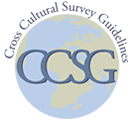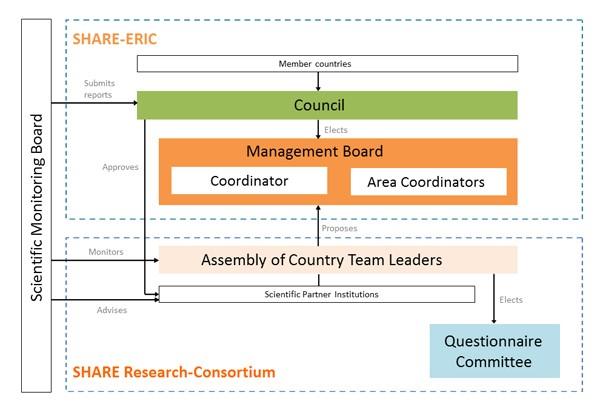- Home
- About Us
- Chapters
- Study Design and Organizational Structure
- Study Management
- Tenders, Bids, and Contracts
- Sample Design
- Questionnaire Design
- Instrument Technical Design
- Translation
- Adaptation
- Pretesting
- Interviewer Recruitment, Selection, and Training
- Data Collection
- Paradata and Other Auxiliary Data
- Data Harmonization
- Data Processing and Statistical Adjustment
- Data Dissemination
- Statistical Analysis
- Survey Quality
- Ethical Considerations
- Resources
- How to Cite
- Help


Appendix B (Organizational Structure)
Below are descriptions of the organizational structures that have been used on some large-scale, cross-cultural survey programs. These examples are only illustrative. Please visit the survey programs’ websites for more information about their structure.
- Survey of Health, Ageing, and Retirement in Europe (SHARE) [zotpressInText item="{2265844:DBE7A5IC}"].
- The governance of the scientific work to build up SHARE involves three separate bodies: a legal entity called SHARE-ERIC, a research consortium formed by the scientists who carry out the scientific work in SHARE, and a Scientific Monitoring Board which is independent from the two other bodies and advises both SHARE-ERIC and the Research Consortium.

-
- All members of the SHARE-ERIC are represented on the Council, which has full decision‑making powers, including the adoption of the budget. The Council appoints the Coordinator, the Vice-Coordinator, and the Coordinator Management, as the legal representatives of the SHARE-ERIC and the other members of the Management Board (the executive body of the SHARE-ERIC).
- The Management Board proposes all strategic and budgetary decisions to the Council. It is responsible for all financial and governance processes which maintain scientific integrity, cross-national comparability, and an overall balance of the SHARE survey design. Specifically, it is accountable for the SHARE-ERIC’s finances and deliverables, and for observing legal requirements such as data confidentiality and safety regulations at the European level.
- The Scientific Monitoring Board monitors the scientific quality of SHARE. It gives feedback to the Management Board and the research consortium at least once per year. Every two years, the Scientific Monitoring Board issues a written report to the Council of the SHARE-ERIC. This report also assesses the services offered to the users of the SHARE data.
- SHARE is organized in various teams, including country teams, area teams, teams providing weights and imputations, programmers, and the central coordination team. SHARE is coordinated in Germany at the Munich Center for the Economics of Aging (MEA) Max Planck Institute for Social Law and Social Policy.
- Country teams play a crucial role, particularly when knowledge of the language or other country specific issues is needed.
- Area coordinators are responsible for the central research fields of SHARE: economics, health, health care and social networks.
- Weights and imputations are managed by expert teams in Italy.
- The programming of the instrument and data distribution is conducted by CentERdata, located at the University of Tilburg, Netherlands.
- European Social Survey.
- Each member of the ESS ERIC has a national representative in the General Assembly. The General Assembly appoints the Director, has full decision making powers regarding the operations and management of the ESS ERIC, and has three standing committees: a Scientific Advisory Board, a Methods Advisory Board, and a Finance Committee.
- The Central Coordinating Team is responsible for overseeing the entire study and is in contact with the Funders, the Scientific Advisory Board, the Specialist Advisory Groups, and the National Coordinators/Survey Institutes.
- The Scientific Advisory Board consists of representatives from each participating country, two representatives from the European Commission, and two representatives from the European Science Foundation.
- The Specialist Advisory Groups have separate teams with expertise in question design, methods, sampling, and translation.
- The National Coordinators/Survey Institutes have one director from each country and one national survey organization from each country. The survey organizations are chosen by their country’s respective national academic funding body.
- International Social Survey Programme (ISSP).
- The Programme consists of countries which are ISSP members, the ISSP secretariat, the ISSP archive, the ISSP sub-groups drawn up within the ISSP, drafting groups for modules, and methodology research groups.
- General meetings are held once a year. Each participating nation is entitled to be represented at the General Meetings by not more than three people. If there is no consensus upon a matter, a vote may be taken in which each country has one vote. Decisions are by simple majority of the countries present and eligible to vote at a specific General Meeting. A major function of these meetings is to work on modules. Those members who are not to conduct a particular round of the survey have no vote on the questionnaire for that year. Programme meetings and surveys are conducted according to the ISSP Working Principles, which set out business procedures for meetings, for conducting surveys, and for archiving data.
- A Standing Committee on organizational matters is elected to assist the Group in making decisions on membership, venues for future meetings, funding of joint activities, etc. The Standing Committee consists of the Secretariat and four other members elected for four-year terms.
- A Methodology Committee is elected to assist the Group in assessing and enforcing the technical standards of the ISSP. The Methodology Committee has seven members, elected by the General Meeting. Each member is elected for a four-year term. The Methodology Committee may create sub-committees to carry out the various tasks assigned to it and appoint other ISSP members to assist in its tasks and serve on the sub-committees, and should consult with experts outside the ISSP as needed.
- The General Meeting selects a Drafting Group of three to six member nations to prepare a draft questionnaire on behalf of the Group.
- Global Barometer Surveys (GBS).
- The Global Barometer Surveys are a network of regional barometers that have been adapted to world regions undergoing rapid political and economic change. Currently, the Global Barometer Surveys include Africa (Afrobarometer), East and South Asia (Asian Barometer Survey), Central and South America (Latinobarómetro), and the Middle East (Arab Democracy Barometer).
- The organizational structure of the Global Barometer network is based on the idea of self-governance—i.e. each regional barometer directs its own roster of research institutes located in the 50 countries where surveys are conducted. For example, the Afrobarometer commissions data collection in Nigeria from Practical Sampling International, and in South Africa from Citizens Surveys. However, to properly coordinate the operation of each regional barometer and maintain high standards of research, the GB network is managed with three bodies:
- An Executive Board, composed of one representative from each regional barometer. The Executive Board provides leadership and makes decisions for the Global Barometer, develops proposals for research and funding, plans and coordinates surveys according to a common schedule, and authorizes other actions, including delegating tasks to working groups.
- A General Meeting, representing the national partners in the network. The purpose of the General Meeting is to discuss GB protocols, to raise new subjects, and to provide inputs into Executive Board decisions. Through region-wide and cross- regional meetings in different cities, the GB network also hammers out questionnaires, develops new methods, and reports results through an iterative process of professional exchange.
- An Advisory Board, consisting of respected senior analysts and practitioners. The Board provides general advice, technical expertise, and professional contacts on as-needed basis.
- World Mental Health Surveys [zotpressInText item="{2265844:3KKBF5LK}"].
- The World Health Organization is invested in the objectives of this survey and works closely with two study-level Principal Investigators. These study-level researchers make many of the ultimate decisions for the entire study. The World Health Organization is in contact with the Data Collection Coordination Center and the Analysis Coordination Center.
- The Data Collection Coordination Center is instrumental in writing and implementing the specifications for pre-production and production activities. The University of Michigan is the Data Collection Coordination Center and its tasks include such activities as selecting survey organizations, training interviewers, and providing assistance during data collection.
- The Analysis Coordination Center makes decisions regarding post-production activities. Harvard University is the Analysis Coordination Center.
- The Working Groups are analysis teams that focus on one particular aspect or analytic perspective of mental health. Each Working Group is led by a Chair. Examples of focal topics include the following: ADHD, drug dependence, gender, social class, suicide, and personality disorders. The Working Groups are in contact with the Analysis Coordination Center and the Principal Investigators from each country.
- The Principal Investigators from each country oversee their respective country’s survey.
- The Data Collection Organizations are the survey organizations within each country that carry out the field operations.